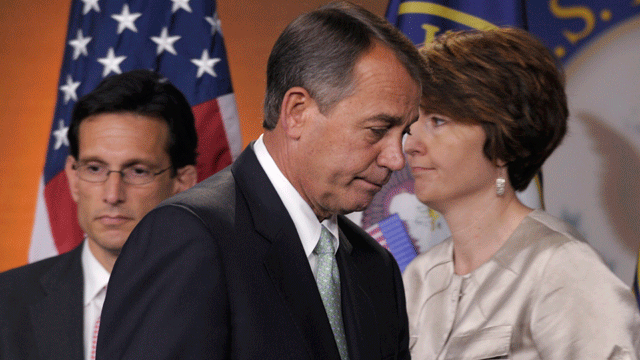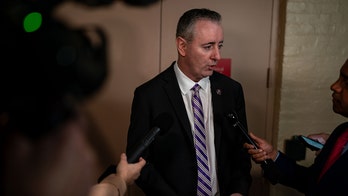
House Speaker John Boehner of Ohio, center, during a news conference with House Majority Leader Eric Cantor, R-Va., left, and Rep. Cathy McMorris Rodgers, R-Wa., right, on Capitol Hill in Washington, Friday, July 15, 2011.
House Republican lawmakers are strategizing how to get a debt deal done in short order and avoid any potential loss in the U.S. credit rating, saying Friday they will vote on legislation next Tuesday to "cap, cut and balance" the budget.
The legislation -- an extension of a pledge introduced by Sen. Mike Lee, R-Utah, and signed by dozens of GOP lawmakers this week -- aims to reduce federal spending, impose spending caps over the next decade and require the eventual passage of a balanced-budget amendment to raise the debt ceiling.
The "cap, cut and balance" provision would include a debt ceiling increase, though the size of the package and period of time it would cover is still being debated.
The proposal was the latest movement over a debate that has been festering for months and led to President Obama holding his second news conference of the week Friday in which he reiterated calls for a "grand bargain" and a balanced approach that includes new revenues along with spending cuts.
Speaking in a press conference, House Majority Leader Eric Cantor said the GOP approach will "demonstrate that we are getting things under control and so that the people who put is here can gain some confidence that we're going to live like they do ... We hope our Democratic friends on the other side of the aisle can join us in that balanced approach."
"We need real spending cuts, and spending cuts that would exceed the amount of debt" that would be increased, House Speaker John Boehner said.
"We asked the president to lead, we asked him to put forward a plan, not a speech, a real plan, and he hasn't, but we will," Boehner said.
But Obama said he hasn't seen "a credible plan" that would get lawmakers to $2.4 trillion "without really hurting ordinary folks."
"And the notion that we would be doing that and not asking anything from the wealthiest among us or from closing corporate loopholes doesn’t seem like a serious plan to me,” Obama said.
House Democrats sent the same message Friday.
"We are not reducing the deficit on the backs of our Social Security and Medicare recipients," House Democratic Leader Nancy Pelosi said in a news conference with other Democratic leaders.
The latest talks between the White House and GOP negotiators broke off when Democrats called for $1.5 trillion in spending reductions while Republicans insisted on $2.4 trillion.
Democrats say their debt reduction would be higher but Republicans are holding up a "grand bargain" that would call for $4 trillion in debt reductions because they refuse to raise $1 trillion in taxes on upper income Americans.
The strategy comes as the words "government shutdown" creep back into the vernacular over the impasse to a debt reduction deal that the Obama administration says is needed by Aug. 2 to avoid a default and a reduction in U.S. credit worthiness in the open market. Moody's said Thursday that it could downgrade the nation's credit even if Washington gets past its intransigence over raising the $14.3 trillion debt limit.
But several House Republicans are questioning whether the Obama administration's Aug. 2 deadline is phony. Rep. Darrell Issa, R-Calif., said Friday that the government is funded through Sept. 30, the result of a continuing resolution signed into law this spring. Issa added that President Obama is being "intransigent," and he called the Aug. 2 date "arbitrary" and fabricated.
"We're trying to make sure that that the president's attempt to shut down the government doesn't happen," Issa said as Republican lawmakers huddled behind closed doors, delaying a press conference to discuss their next moves in the epic battle over raising the debt ceiling past its $14.3 trillion limit.
Before Issa spoke, 63 House Republican freshmen released a letter they sent to the president arguing against the need for a debt limit increase. The letter, while saying lawmakers hope to reach an agreement with the administration on spending levels soon, expressed "strong concern" about comments by Treasury Secretary Tim Geithner, who said the day before that the Aug. 2 date is firm for the federal government getting new borrowing authority or possibly defaulting.
"We ask that you clarify for the American people that the Treasury will in fact continue making the monthly interest payments owed on our national debt, even if the debt ceiling is reached," the freshmen wrote.
"Statements by Secretary Geithner have led many Americans to believe that reaching the debt ceiling will cause the United States government to go into default on its interest payments August 2nd if the debt ceiling is reached. Clearly, that is not the case," they wrote.
The lawmakers pointed out that the government is collecting $2.23 trillion in fiscal year 2011, which ends Sept. 30, but the total estimated interest payment for the same time is $213 billion. They argued that along with Social Security, Medicare and military salaries, the administration is able to fund its priorities.
"Allowing statements to the contrary jeopardizes the good faith and credit of the United States," they argued.
The GOP questioning of the deadline is fraught with peril. According to recent Quinnipiac polling, a greater plurality of Americans say they would blame the GOP than Obama for a default, and they trust the president more to handle the economy.
Obama has taken that mantle and run with it, holding multiple pressers in the past two weeks, including one scheduled Friday, and challenging the GOP to call his bluff over whether he would take his case to the American people.
A senior official told Fox News on Friday that the president plans to "keep charging ahead" in his case to get the job done and saying he has offered "significant concessions," meaning cuts to many programs he supports that he would not cut in a different economic climate.
The president will continue emphasizing this is a "golden opportunity," and leaders in Washington should not miss this moment, the aide said.




